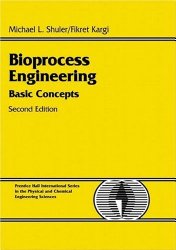Engineering Bookshelf
- Aerospace
- Biological
- Civil
- Chemical
- Environmental
- Electrical
- Materials
- Mechanical
- Petroleum
- Geoengineering
- Software

Basic Concepts of Bioprocess Engineering
by Michael L. Shuler, Fikret KargiPublisher: Prentice Hall
ISBN: 0130819085
Check price @ amazon.com , amazon.ca , amazon.co.uk
Book Description
The complete, fully updated introduction to biochemical and bioprocess engineering.
Bioprocess Engineering, Second Edition is a comprehensive update of the world's leading introductory textbook on biochemical and bioprocess engineering. Drs. Michael L. Shuler and Fikret Kargi review the relevant fundamentals of biochemistry, microbiology, and molecular biology, introducing key principles that enable bioprocess engineers to achieve consistent control over biological activity. This edition reflects powerful advances that are transforming the field, ranging from genetic sequencing to new techniques for producing proteins from recombinant DNA. It introduces techniques with broad application to the production of pharmaceuticals, biologics, and commodities; to medical applications such as tissue engineering and gene therapy; and for solving critical environmental problems. This new edition includes:
- Essential biological basics: microorganism structure and functions, major metabolic pathways, enzymes, microbial genetics, kinetics, and stoichiometry of growth
- New coverage of posttranslational processing of proteins-an essential technique for manufacturing therapeutic proteins
- In-depth coverage of animal cell culture processes
- New coverage of noncarbohydrate metabolism
- Functional genomics and cellular engineering: concepts, techniques, and applications
- Applying bioprocess engineering approaches to biomedical applications
- Nonconventional biological systems applications, including host-vector systems for producing proteins from recombinant DNA
- Extensive coverage of mixed cultures, including advanced wastewater treatment processes
- Expanded coverage of modeling, including models in continuous cultures and cybernetic modeling
- How the rapidly evolving governmental regulatory environment constrains bioprocess design and modification
Bioprocess Engineering, Second Edition makes extensive use of illustrations, examples, and problems, and contains extensive references for further reading as well as a detailed appendix describing traditional bioprocesses.
Customer Reviews
By utsav
The book came in a perfect condition...I am a chemical engineer and needed something to upgrade my knowledge to the biotech industry as I got work in the industry..this was a perfect buy and it complemented my knowledge and provided me with the details I needed...
By J. Haigh
After having worked in another industry for a few years, I bought the book to review and update my knowledge of bioprocess engineering. I am extremely pleased, and recommend it almost without reservation. After an introduction, the next few chapters provide a solid basis in cell biology, incorporating recent advances in that field. Part 3 ("Engineering Principles for Bioprocesses") and Part 4 ("Applications to Nonconventional Biological Systems") appear well laid out an balanced, though I admit I have only scanned those sections. The valuable Appendix describes several "traditional" bioprocesses (roughly meaning processes that were commercial before 1970), presenting the process development history of Penicillin, HFCS, and other products.
The small complaint is this. The authors could give more details of available process equipment and fewer derivations of equations for calculations that working Chemical Engineers are never likely to perform. This is true, I'm afraid, of most Chemical Engineering books.